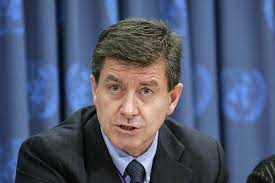

In a statement recently delivered to the 2014 Spring meetings of the IMF and the World Bank, Ryder warned of rising global unemployment, which he said will widen to 75 million by 2018. In 2013, the number of workers in extreme poverty declined by only 2.7 per cent worldwide, one of the lowest rates of reduction ever seen over the past decade. Ryder acknowledged that income inequalities have also widened and that the wage share in GDP has fallen in many countries, including some of the world’s largest economies where they have lagged behind growth in productivity for over 20 years.
Ryder explained, “The global economy is not yet on a path to strong sustainable and balanced growth. Weak global demand is holding back job creation, wages and recovery even further and one consequence is a slowing of the pace of poverty reduction in the developing world.”
He added that in order to facilitate economic growth, the global economy must create many more jobs as well as investing in infrastructure, supporting small enterprises and boosting skills development. He welcomed the G20 Finance Ministers’ aim to lift GDP by 2% or more over five years but did, however, call for an integrated strategy for both the demand and supply side of labour markets that would lift growth and create the jobs needed for a full and sustainable recovery.




